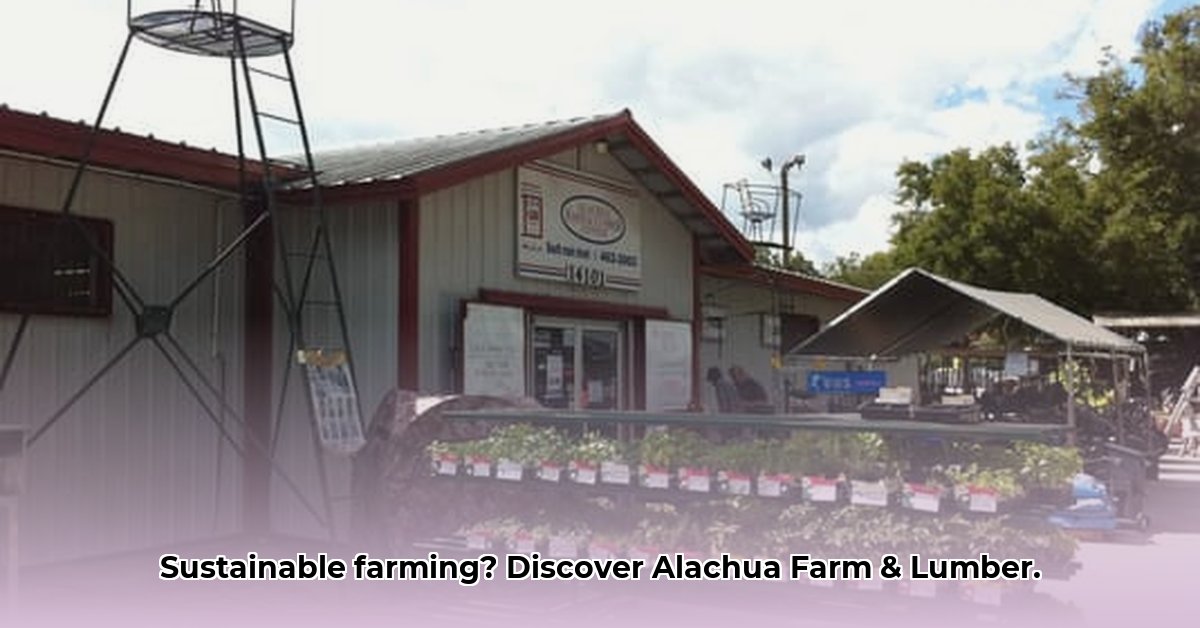
Alachua Farm & Lumber: A Case Study in Sustainable Agricultural Supply
Alachua Farm & Lumber (AFL), nestled in the heart of Alachua County, Florida, presents a compelling case study in the intersection of local business and sustainable agriculture. While AFL offers essential supplies to local farmers—lumber, tools, and landscaping materials—its potential contribution to sustainable practices remains largely untapped. This case study analyzes AFL's current operations, identifies key opportunities for improvement, and proposes actionable recommendations for the business, local farmers, environmental organizations, and consumers. Are AFL's operations as environmentally friendly as the products they sell? Let's delve into the details. For examples of other successful sustainable lumber businesses, see Dolan Lumber.
Current Operations and Data Limitations
Currently, comprehensive data on AFL's sustainability practices is limited. Information regarding the sourcing of lumber (is it responsibly harvested? Is recycled material used?), waste management strategies, and energy consumption is unavailable. This lack of transparency hinders a complete assessment of AFL's environmental impact. It's akin to piecing together a puzzle with only a few key components.
This information gap, however, isn't necessarily a criticism, but rather highlights an opportunity. Many businesses are still navigating the complexities of integrating sustainability. The absence of data presents a starting point for exploration and improvement.
Key Findings and Integrated Analysis
Despite limitations in available data, several key observations emerge:
- Untapped Potential: AFL's central location within a thriving agricultural community offers significant potential to positively influence sustainable farming practices in the region. Its influence could extend far beyond its immediate sales.
- Community Engagement: Building strong relationships with local farmers and environmental NGOs is vital for aligning AFL's operations with community sustainability goals.
- Transparency Gap: Increased transparency regarding sourcing practices and sustainability certifications would build trust with customers and stakeholders, a critical element of successfully embracing sustainable practices.
These findings underscore the need for further investigation. A comprehensive sustainability audit could illuminate AFL’s current environmental footprint and guide future strategies.
Actionable Intelligence: A Roadmap for Sustainability
To realize its full potential, AFL should adopt a multi-pronged approach incorporating the following actionable steps:
Comprehensive Sustainability Audit: A thorough audit of all operations—from material sourcing to waste management—is paramount. This audit should be publicly accessible, promoting transparency and accountability.
Community Partnerships: Building collaborative relationships with local farmers and environmental organizations is crucial. Understanding their needs will allow AFL to offer tailored solutions and mutually beneficial partnerships. (Consider offering workshops on sustainable farming practices.)
Enhanced Communication: Openly communicating AFL’s sourcing practices and any sustainability certifications obtained will build consumer trust. This includes detailed information about where materials originate and how they are processed.
Innovation in Sustainable Practices: AFL should explore innovative solutions such as increased use of recycled wood, support for reforestation projects, and the development of products specifically designed to assist farmers' transition to sustainable methods.
Consumer Education: AFL can play a leading role in educating consumers about sustainable agriculture. This could involve workshops, online resources, or partnerships to spread awareness and understanding of the broader impact of their purchasing decisions.
Conclusion: A Shared Vision for Sustainable Success
Alachua Farm & Lumber's success is intrinsically linked to the broader trajectory of sustainable agriculture in the region. By embracing transparency, fostering community collaborations, and prioritizing environmentally sound choices, AFL can become a leader in sustainable agricultural supply. This requires concerted effort and continuous research to adapt to evolving best practices and unforeseen challenges. The journey towards greater sustainability requires collective action and ongoing evaluation. Further research, including detailed life-cycle assessments of AFL's products, would provide more granular data to refine and improve these recommendations even further.